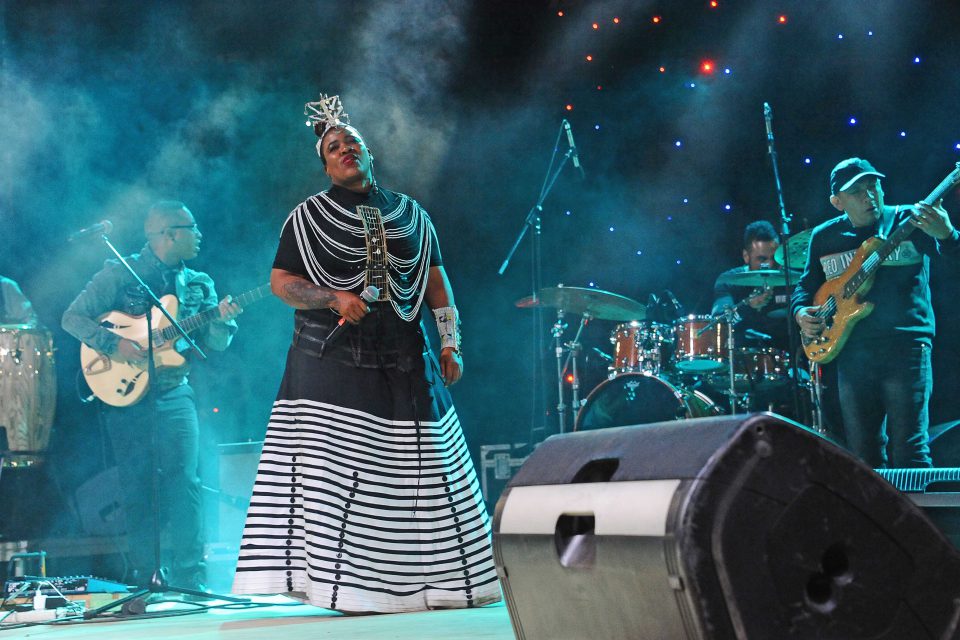Mazwai does it for Masekela
Thandiswa Mazwai channels the process, dynamic and spirit of Hugh Masekela as she and his band effortlessly tie together notes and strands from past and present.
Author:
13 November 2019

The title track of Hugh Masekela’s 1975 album, The Boy’s Doin’ It, has an undeniable groove.
The cheeky riff of the bass guitar acts as a call. Three simple crunchy chords sound first and then an ensemble of male voices responds, “The boy is doin’ it, ah.”
The conversation continues. A three-part crunch.
The boy is doin’ it, eh
Crunch
The boy is doin’ it, what?
Crunch
The boy is doin’ it, right!
Crunch
Watching a clip of his performance in Lugano, Switzerland in 2009, there is something about the groove that weights Masekela at the knees and gives him a swagger as he bounces to the beat. One can imagine that Masekela carried a similar swagger when he first performed the song with his band OJAH in the early 70s.
A decade later, on the stage at the Soweto Amphitheatre, Thandiswa Mazwai’s knees also fall heavy as The Hugh Masekela Band start playing the opening chords to The Boy’s Doin’ It in Soweto.
Mazwai and The Hugh Masekela Band were the headline act at the Hugh Masekela Heritage Festival, in its fifth iteration in 2019. It was a momentous moment, heavy with emotion. It was the first time that the festival had been staged since Masekela died in early 2018.
Mazwai was clearly in her element on stage. “The boy is doin’ it” she sang, mimicking an accent that can be vaguely stereotyped and generalised as Caribbean.
“He’s doin’ it in the jungle, doin’ it in Hollywood, doin’ it in Zaire, doin’ it in Jamaica, he’s in Alabama doin’ it…” she sang in the kind of loose, run-on structure that is part of the styling of the original song, which is an emblem of the OJAH band. Together, they solidified a genre-less sound that ebbed in between a heavy mix of jazz, highlife, mbaqanga, Congolese rhumba and R&B. The band, like the song, is of the world.
In unity, closeness
In his autobiography, Still Grazing: The Musical Journey of Hugh Masekela, Masekela writes that the name OJAH came from the Nigerian slang for “very close friend”. OJAH was, in Masekela’s description, “a more African-urban oriented unit”.
The spirit of OJAH was clearly present at the Soweto Amphitheatre as Mazwai stood among Masekela’s last touring all-male band. Leeroy Sauls, Godfrey Mgcina, Johan Mthethwa, Fana Zulu, Cameron Ward, Sithembiso Bhengu and Thami Mahlangu fell into Mazwai’s rhythm and started doin’ it for their mentor – a timely tribute as the festival fell in what would have been his 80th year.
Sauls, who had been Masekela’s drummer for 12 years, said before the band went on stage, “It’s feeling very emotional today, but ugh man, we are going to do it, we’ll do it for Hugh.”
Related article:
Two weeks before the festival, New Frame visited Mazwai and The Hugh Masekela Band at their first rehearsal at the Bassline in Newtown. Most of the band had not seen each other in a long time. The mood was joyful, filled with laughter, jokes and the smell of freshly rolled blunts. Everyone seemed to have an anecdote at the ready about Hughey, as he was affectionately known.
Mazwai took part in the banter. She gave suggestions for a possible set list, but seemed slightly withdrawn, perhaps even pensive. It was a busy week for her. After the rehearsal, she left to record with her old Bongo Maffin bandmates for a new project dropping at the end of November.
Co-organiser of the festival Mabusha Masekela sat on a stool in the back of the rehearsal room, listening intently to his uncle’s songbook being delicately tinkered with by old friends. The band started rehearsing one of the most iconic songs in Bra Hugh’s catalogue, Stimela. A calm fell as soon as Mazwai began singing. An ancestor had been welcomed into the space. Hughey was in the room.
Colonial Man
“The period when I was his road manager was probably one of the greatest periods in my life, because every night I got to hear great music and it was never the same every night, but it was always great,” Mabusha remembered.
Mabusha recalls his uncle as an extraordinary musician, a consummate craftsman. But what is perhaps most compelling to him about Masekela’s musical legacy is how seriously he took issues of empire, colonisation and freedom.
“So Hughey has got an album called Colonial Man and on that album we are introduced to Queen Victoria, King Leopold of Belgium, Livingstone and Stanley” said Mabusha, listing some of the key protagonists who systematically initiated the degradation of the colonial South.
“Through Hughey’s music [on that album], I was able to think through a meta-analysis of the historical narratives that we are a part of and, through him, I was able to understand history more wholly versus what we often taught about ourselves and Africa in the diaspora.”
Related article:
Masekela’s autobiography reflects on recording music in this period:
“In between touring, we completed the album, Colonial Man, at New York’s Midtown Studios. It was full of satirical sociopolitical songs about colonisation. Vasco da Gama was a cha-cha salsa condemning the Portuguese explorer for his expeditions in the Far East, during which he stopped at the South African coastal bays for fresh water and supplies. ‘Vasco de Gama, he was no friend of mine’, the hook line went.
“Cecil Rhodes was a similar put-down, in this case of the British entrepreneur who exploited the rich mineral deposits of South Africa, Zambia and Zimbabwe. A Song for Brazil was a samba-salsa in praise of the music of that country, which grew out of the slave community that was forcibly removed from Africa to the state of Bahia by Portuguese traders. This was the general flavour of the record.”
Riffing through genetic memory
Mazwai sits in an elite group of musicians across the world who imbue the present with the weight of history, and reverence. Her work is transcribed through a sonic palimpsest – a consistent working in conversation with the past – with each of her riffs decadently tying together ribbons of the past and the present.
It is a gift of which she is aware, but does not fully acknowledge.
“Thinking about the archive has been a personal obsession of mine from the very beginning,” Mazwai began gently. “It wasn’t necessarily about archiving or trying to reimagine something [in the past], but it was mostly about memory and trying to find ways to iconise some of my experience.”
The spirit of the great African-American novelist Toni Morrison sits alongside her reflection of the musical archive she has patterned together over the years.
In the foreword of her fourth published book, Tar Baby, Morrison reflects on how her inherited memories laid the foundation for her literary fiction. Her inherited memories ebb and flow between her, her mother and grandmother, and are held together through the collective practices of listening, watching and seeking advice from her matrilineal lineage. Genetic memories become the canvas on which she creates literary worlds.
In her essay, The Site of Memory, Morrison writes simply: “I must trust my own recollections. I must also depend on the recollection of others. Thus memory weighs heavily in what I write, in how I begin and in what I find to be significant. Zora Neale Hurston said, ‘Like the dead-seeming cold rocks, I have memories within that came out of the material that went to make me.’ These ‘memories within’ are the subsoil of my work.”
Related article:
Mazwai carries a similar sensibility to Hurston and Morrison. She considers her answer gently, making sense of her thoughts, slowing down, pausing often, as if she were slowing down her words to distil the clarity of her thoughts.
“Over the years,” she said, “I have done a lot of work around memory and in that memory, I pulled melodies, I pulled harmonies, I pulled words, I pulled experiences – all of these things that made up my genetic memory.
“For me, my musical journey has been about reigniting those memories within myself.
“I’ve looked at traditional Xhosa music, I’ve looked at music of the apartheid struggle, I’ve looked at Zulu music, I’ve looked at South African standards. I’ve also looked at rituals and so perhaps in hindsight I’ve entered into a process of archiving or re-archiving that kind of music, but I don’t think that I was ever necessarily aware of that as a practice.”
She stopped, considering her answer again.
“Maybe on the last album, the jazz album, Belede, that was kind of a distinct uhm … hmmm … there’s a word I’m looking for,” she said, her voice trailing off as she tried to stitch her thoughts back together.
“But you know,” she added quizzically, “what’s interesting is that is something that Bra Hugh had been telling me to do for many, many years.
“I used to record Bra Hugh every time he spoke,” she said laughing, as an imaginary recording device suddenly appeared in her hand. “Every time he’d speak, I’d be like, hhmm, tell me more… and then… so then what happened?
“In most of those recordings,” Mazwai continued, entranced by the vivid memories of Masekela’s voice, “he is just telling me about choral music from the 1920s, about pennywhistle music from the 1950s, he’s telling me about the funk stuff in the 1970s, he’s telling me about all the other pop stuff and jazz stuff and all these other different names. Some of the other stuff that I used to record were rehearsals because I liked how he used to approach the harmonies – he had his own way of approaching harmony.”
“Geez!” chimed Sauls, “I wish I had done that!”
Sacred performances
Mazwai seems to document a lot of her process on social media. Some of her posts offer glimpses into her thoughts on performances – a digital journal documenting these thoughts in real time and offering them up to the world as short, sharp sonnets evading the banality of the 140 characters of Twitter.
The day before the festival, Mazwai tweeted: “The stage has always been a site of ritual for me. Even without the burning of imphepho I merge myself in the fellowship between us musicians and the sacred spaces we can create with sound. Every song is a ritual for suffering and landless masses.”
Back at the Bassline, Mazwai scrolled to an old Instagram post she captioned simply as “What Ms Nina Simone said about music”. It appears as a digital sonnet on her Instagram page.
The structure
The clean-ness
The tone
The nuances
The implications
The silences
The dynamics…
All have to with sound
And it’s as close to God as I know
As Mazwai sings the The Boy’s Doin’ It, onstage there are fractions of Masekela that appear. In the groove she inhabits, the weight of her movement and the approach to the process. Like Simone, Mazwai considers the tone and nuances in her phrasing. It is clear that the implications and silences of history are present in the way she thinks about and subsequently performs the music. The whole performance is an exercise in dynamics. And there is the closeness to God, perhaps even an ancestor. Hugh.
King Tha is with the boys and they are doin’ it.



